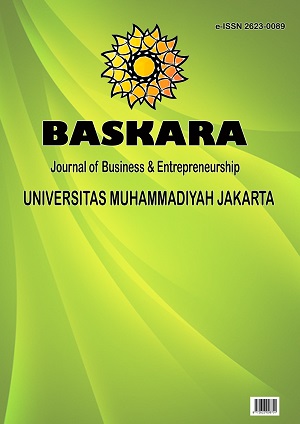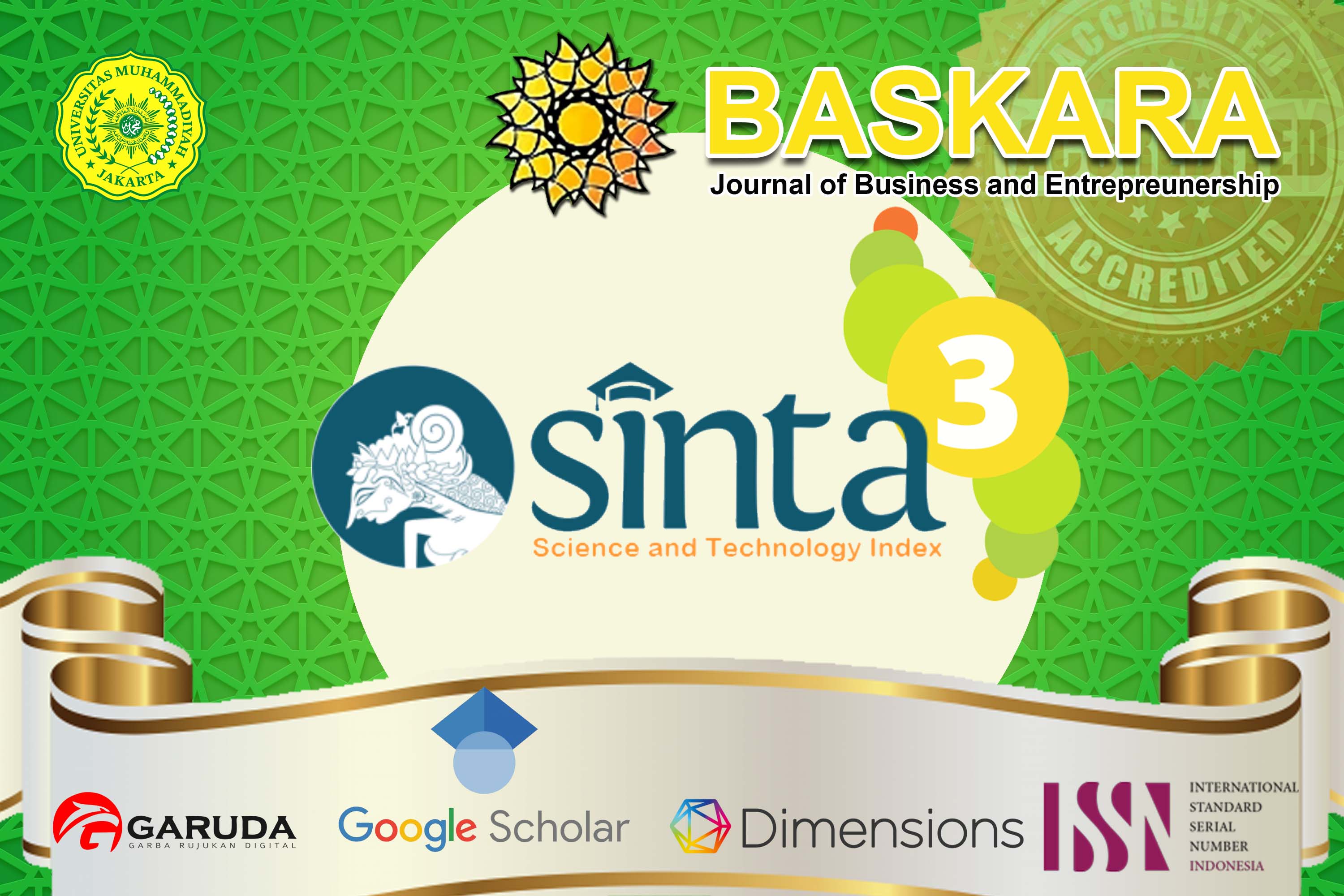Brand Awareness: The Influence of Social Media During the Covid-19 Pandemic
DOI:
https://doi.org/10.54268/baskara.v5i1.14045Keywords:
brand awareness, consumer behavior, Covid-19, social mediaAbstract
Today, social media is unavoidable, especially as we embrace the 'new normal.' As our use of social media evolves because of the epidemic, it becomes an increasingly valuable communication channel for both brands and consumers. As a result of the current global pandemic and its imposed lockdowns, millions of individuals have resorted to the Internet to socialise. Social media has become an integral part of our everyday lives, not just when we are striving to preserve social distance. Social networking has now become the accepted standard. Marketers have taken notice of this emerging social phenomenon. There has been a change in both customer behaviour and marketing strategies. Consequently, the purpose of this preliminary study is to determine the influence and application of social media as a digital marketing strategy for increasing brand awareness during the Covid-19 pandemic. In Kota Kinabalu, Sabah, 100 respondents were surveyed using an internet questionnaire for a study (Google Form). During Covid-19, social media marketing was effective at increasing brand recognition, according to the findings. Marketers must rethink how they evaluate and target the modern consumer. It is essential to explore and analyse the current situation, since doing so will assist marketing, technology, and communication in the long run.References
Adi, J. et al (2021). Perceptions of Urban Poor with B40 status on the Impact of the Implementation of Movement Control Order (MCO) by Employment Sector: A Case Study of Kota Kinabalu City, Sabah. Journal of Contemporary Issues in Business and Government, Vol.27, No.2,2021 https://cibg.org.au P-ISSN: 2204-1990; E-ISSN: 1323-6903.
Adedoyin, O. (2020). Quantitative Research Method. Near East University.
Ahmad, Naveed. & Guerrero, E. (2020). Influence of Social Media on Brand Awareness: A Study on Small Businesses. University of Gävle.
Akram, W. & Kumar, R. (2017). A Study on Positive And Negative Effects Of Social Media On Society. International Journal of Computer Sciences and Engineering, 5(10), pp 347-354.
Alhaddad, A. A. (2015). The Effect Of Advertising Awareness On Brand Equity In Social Media. International Journal of e-Education, e-Business, e-Management and e-Learning, 5(2), pp 73-84.
Ansar, S. et al. (2019). Impact of Brand Awareness and Social Media Content Marketing on Consumer Purchase Decision. Journal of Public Value and Administration Insights, ISSN: 2663-9181.
Appel, G., Grewal, L., Hadi, R., & Stephen, A. (2020). The Future Of Social Media In Marketing. Journal of the Academy of Marketing Science. 48, pp 79–95.
Aydin, G., Uray, N., & Silahtaroglu, G. (2021). How to Engage Consumers through Effective Social Media Use - Guidelines for Consumer Goods Companies from an Emerging Market. Journal of Theoretical and Applied Electronic Commerce Research. 16, pp 768–790. https://doi.org/10.3390/jtaer16040044.
Barmola, K. & Srivastava, S. (2010). The Role of Consumer Behaviour In Present Marketing Management Scenario. Productivity, 51(3), 268-275. ISSN: 0032-9924, eISSN:0976-3902
Bîja, M. & Balaş, R. (2014). Social Media Marketing to Increase Brand Awareness. Journal of Economics Business Research. No. 2, pp. 155-164. ISSN: 2068 - 3537, E – ISSN (online) 2069 – 9476, ISSN – L = 2068 – 3537.
Chierici, R. & Del Bosco, B. & Mazzucchelli, A. & Chiacchierini, C. (2018). Enhancing Brand Awareness, Reputation and Loyalty: The Role of Social Media. International Journal of Business and Management. 14. 216. 10.5539/ijbm.v14n1p216.
Dülek, B. & Saydan, R. (2019). The Impact of Social Media Advertisement Awareness On Brand Awareness, Brand Image, Brand Attitude And Brand Loyalty: A Research On University Students. International Journal of Contemporary Economics and Administrative Sciences. Vol. 9, Issue 2, pp 470-494, I: 1925-4423.
Dwivedi, Y. K. et al. (2021). Setting the Future of Digital and Social Media Marketing Research: Perspectives and Research Propositions. International Journal of Information Management, Volume 59, 102168, ISSN 0268-4012.
Ezeife, L. N. (2017). Social Media Strategies for Increasing Sales. Walden University.
Fuciu, M. (2019). Can Social Media Addiction Influence the Consumers’ Loyalty for a Certain Brand or Product? International conference KNOWLEDGE-BASED ORGANIZATION. 25. 52-56. 10.2478/kbo-2019-0056.
Gustafsson J. (2017). Single Case Studies Vs. Multiple Case Studies: A Comparative Study (Thesis). Halmstad, Sweden: Halmstad University.
Heale, R. & Twycross, A. (2018). Research Made Simple. Evid Based Nurs.No. 1, Vol, 21.
Išoraitė, M. (2016). Raising Brand Awareness Through the Internet Marketing Tools. Independent Journal of Management & Production (IJM&P). Vol. 7, No. 2. ISSN: 2236-269X. DOI: 10.14807/ijmp.v7i2.391.
Johansson, M. (2010). Social Media and Brand Awareness - A Case Study in the Fast Moving Consumer Goods Sector. Luleå University of Technology. ISSN: 1402-1773.
Lee, E. (2013). Impacts of Social Media on Consumer Behavior - Decision Making Process. Turku University of Applied Sciences.
Mathers, N., Fox, N., & Hunn, A. (1998). Trent Focus for Research and Development in Primary Health Care: Using Interviews in a Research Project. Trent Focus.
Mazzini Muda & Noor Rita Mohamed Khan (2020). Electronic Word-of-Mouth (eWOM) and User-Generated Content (UGC) on Beauty Products on YouTube: Factors Affecting Consumer Attitudes and Purchase Intention. Malaysian Journal of Consumer and Family Economics Vol 24 (S1), pp 1
Nadaraja, R. & Yazdanifard, R. (2013). Social Media Marketing: Advantages and Disadvantages. Center of Southern New Hampshire University (HELP College of Arts and Technology).
Nuseir, M. T. (2016). Exploring the Use of Online Marketing Strategies and Digital Media to Improve the Brand Loyalty and Customer Retention. International Journal of Business and Management. Vol.11, No.4. ISSN 1833-3850
Perreault, M. & Mosconi, E. (2018). Social Media Engagement: Content Strategy and Metrics Research Opportunities. 51st Hawaii International Conference on System Sciences. p. 3568-3577. DOI: 10.24251/HICSS.2018.451.
Prajapati, Kishan. (2020). A Study on Digital Marketing and Its Impacts. Institute of Nirma Technology. DOI: 10.13140/RG.2.2.21143.80809.
Ritwik Maity & Sukjeet Kaur Sandhu (2021). The Impact of Social Media on Online Purchasing Behaviour of Consumers: An Empirical Study of Youth in West Bengal, India. Malaysian Journal of Consumer and Family Economics Vol 26, pp 42
Renu, Bansal, S. & Gupta, V. (2020). The Influence of Social Media on Consumer Purchase Intention. International Journal of Scientific and Technology Research. Volume 9, Issue 3. ISSN 2277-8616.
Rohana Mijan, Shuhaida Md Noor & Mastura Jaafar (2020). Exploring Strategic Branding Resources for Small and Medium-sized Brand-oriented Companies. SEARCH Journal of Media and Communication Research. SEARCH 12(1), 2020, 29-45.
Saxton, G. D., Niyirora, J. N., Chao Guo, & Waters, R. D. (2015). #AdvocatingForChange: The Strategic Use of Hashtags in Social Media Advocacy. Advances in Social Work, Vol. 16, No. 1, pp 154-169.
Singh, R. (2020). Social Media and Consumer Buying Behaviour: Issues & Challenges.International Journal of Engineering Research & Technology. ISSN: 2278-0181.
Susanto, H., FangYie, L., Mohiddin, F., Rahman Setiawan, A.A., Haghi, P.K. & Setiana, D. (2021). Revealing Social Media Phenomenon in Time of COVID-19 Pandemic for Boosting Start-Up Businesses through Digital Ecosystem. Appl. Syst. Innov. 2021, 4, 6. https://doi.org/10.3390/asi4010006.
Tajudeen, F. P. (2014). Social media usage and its impact on Malaysian organizations (Doctoral dissertation, University of Malaya).
Tritama, H. & Tarigan, R. (2016). The Effect of Social Media to the Brand Awareness of A Product of A Company. CommIT (Communication and Information Technology) Journal. 10. 9. 10.21512/commit.v10i1.1667.
Downloads
Published
Issue
Section
License
In order for Baskara: Journal of Business and Entrepreneurship to publish and disseminate research articles, we need publishing rights (transfered from author(s) to publisher). This is determined by a publishing agreement between the Author(s) and Baskara Journal. This agreement deals with the transfer or license of the copyright of publishing to Baskara: Journal of Business and Entrepreneurship, while Authors still retain significant rights to use and share their own published articles. Baskara : Journal of Business and Entrepreneurship supports the need for authors to share, disseminate and maximize the impact of their research and these rights, in any databases.
As a journal Author, you have rights for a large range of uses of your article, including use by your employing institute or company. These Author rights can be exercised without the need to obtain specific permission. Authors publishing in Baskara : Journal of Business and Entrepreneurship have wide rights to use their works for teaching and scholarly purposes without needing to seek permission, including:
- use for classroom teaching by Author or Author's institution and presentation at a meeting or conference and distributing copies to attendees;
- use for internal training by author's company;
- distribution to colleagues for their reseearch use;
- use in a subsequent compilation of the author's works;
- inclusion in a thesis or dissertation;
- reuse of portions or extracts from the article in other works (with full acknowledgement of final article);
- preparation of derivative works (other than commercial purposes) (with full acknowledgement of final article);
- voluntary posting on open web sites operated by author or author’s institution for scholarly purposes.
Copyright Transfer Agreement for Publishing (Publishing Right)
The Authors who submit manuscript has to understand that if accepted for publication, mean that all copyright and publishing right of the article shall be assigned/transferred to Baskara: Journal of Business and Entrepreneurship as assigned publisher.
- CC BY-NC: This license allows reusers to distribute, remix, adapt, and build upon the material in any medium or format for noncommercial purposes only, and only so long as attribution is given to the creator.
It includes the following elements:
BY ![]() – Credit must be given to the creator
– Credit must be given to the creator
NC ![]() – Only noncommercial uses of the work are permitted
– Only noncommercial uses of the work are permitted
Baskara (C) Copyright (2022):
BASKARA: Journal of Business and Entrepreneurship by https://jurnal.umj.ac.id/index.php/baskara
is licensed under a Creative Commons Attribution-NonCommercial 4.0 International License








